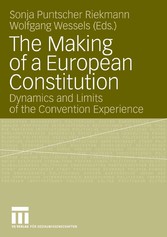Suchen und Finden
Mehr zum Inhalt

The Making of a European Constitution - Dynamics and Limits of the Convention Experience
Contents
6
European Constitutionalism at the Crossroads
8
1. Introduction: Writing a Book on European Constitutionalism in Times of Crisis
8
2. Old Treaties, New Constitution?
13
3. Values, Norms and Identities
14
4. The Union’s Competences: Expanding Tasks towards a State- like Agenda
17
5. The Institutional Architecture: a Restated Equilibrium on a Higher Level
20
6. And Now? The Conundrums of Constitutionalising Power
23
7. References
30
Part I: The Making of a European Constitution: Processes and Methods
34
The Constitutionalisation of the European Union – Without the Constitutional Treaty
36
1. Introduction
36
2. What is a Constitution?
38
3. The European Constitution without a State
44
4. The Constitutionalisation of European Law up to the Adoption of the Constitutional Treaty of 2004
47
5. The Constitutional Treaty of 2004 Overcomes the Outdated Dichotomy Between Contract and Constitution
54
6. The Constitutionalisation of the Treaty Revision Procedure
59
7. Benefits of the Constitutionalist Reconstruction of European Law
63
8. References
64
Getting to a European Constitution: From Fischer to the IGC
69
1. Introduction
69
2. An Analytical Framework
70
3. Phase I: Competing Frames
72
4. Phase II: Agenda Setting
74
5. Phase III: The Convention Phase
76
6. Phase IV: From Convention to IGC
78
7. Getting to a Constitution
86
8. Conclusions
88
9. References
89
The Convention Method: An Institutional Device for Consensus-building
91
1. Introduction
91
2. A Note on Methods: Fieldwork and Data
95
3. From ‘Listening’ to ‘Consensus’: Elements of the Convention Method
96
4. Conclusions
113
5. References
117
Deliberation and Compromise in the Shadow of Bargaining
121
1. The EU’s Constitutional Convention and European System development
121
2. Issue Tracking – European Demos as a Prerequisite or an Outcome of European Integration?
123
3. The Need for Sustainable Debate and the Convention as its Medium
125
4. Conclusions: System Change beyond the Convention
147
5. The Convention was a Deliberative Process – and a Deliberative Sequence
150
6. References
153
The Dynamics of the Two-Level Process of Constitution Building
157
1. Analyzing European Constitution Building
157
2. Two-level Games and the Constitution Building Process
159
3. Delegation, Strategies and Collective Actors
164
4. Studying the Process of European Constitution Building
166
5. References
172
Part II: The Making of a European Constitution: Influences and Perceptions
174
The Impact of Constitutional Traditions on the EU-Reform Discourse in Austria, France, Germany and the UK
176
1. Introduction
176
2. The Method: A Three Dimensional Research Design
178
3. National Conceptions of Sovereignty and the Shape of a Future European Constitution
180
4. Executive – Legislative Relationships and the Introduction of a Bicameral System?
185
5. National Constitutional Arrangements and the Division of Competences in the EU
192
6. Conclusion: The Impact of National Traditions – Two Pathways
195
7. References
196
Political Elites and the Future of Europe: The Views of MPs and MEPs
201
1. Introduction
201
2. Data
202
3. Positions of MPs and MEPs towards European integration
205
4. Results
207
5. Conclusion
213
6. References
214
Publicized Discourses on the Post-Nice Process
217
1. Public Discourse in Context: Legitimacy and Democracy in the EU
217
2. Public Discourse as a Legitimizing and De-legitimizing Force
220
3. The Perceived Utility of Different Forms of Public Discourse in the EU Context
221
4. Political System Development and Legitimacy: The Actual Role of Public Discourses
223
5. From Public Discourse to Publicized Discourse: How the Mass Media Matter
226
6. Theories of EU Governance: Finding a Place for News Media
227
7. Content Analysis as a Research Method to Explore Publicized Discourses
231
8. Preliminary Findings
234
9. References
243
The Ratification of the Constitution and the European Public Sphere
250
1. Introduction
250
2. Democratic Theories and the European Union
252
3. The Constitutionalisation of the EU out of the Perspective of Different Theories of Democracy
256
4. The Theory of Radical Democracy
258
5. References
267
Alle Preise verstehen sich inklusive der gesetzlichen MwSt.








